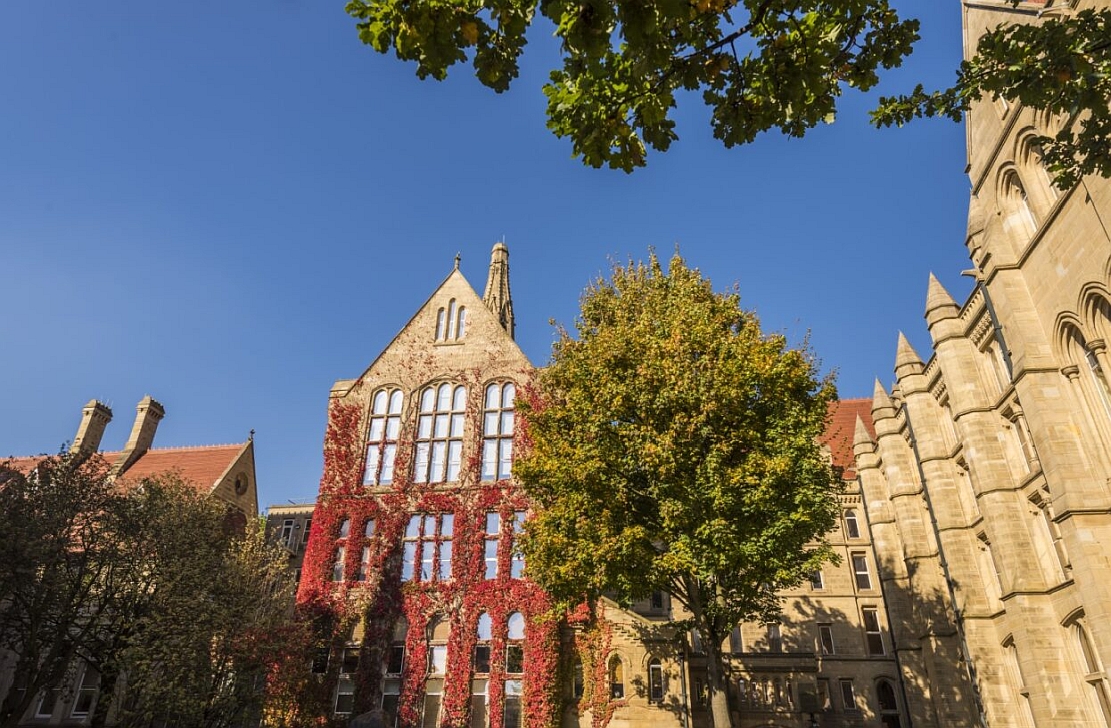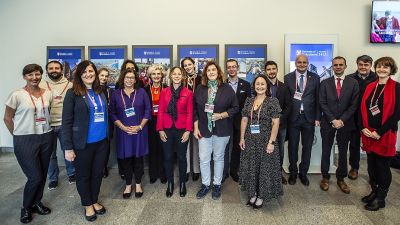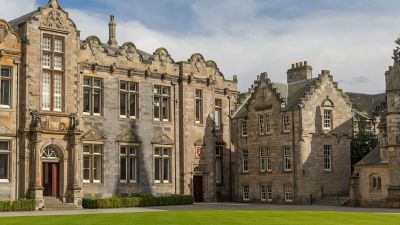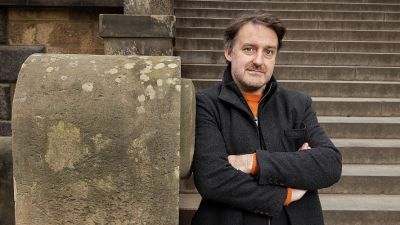The University of Manchester is Europe’s top university for its social and environmental impact in the most recent the Times Higher Education Impact Rankings and the QS Sustainability Ranking. Julian Skyrme, the university’s Director of Social Responsibility, is the driving force behind its strategy. His university, in its approach and consistency, is an example for anyone who takes sustainability seriously, including administrators and researchers at Charles University. In our interview, we began by asking what social responsibility means and how some aspects in Manchester are tied to UoM’s ‘red brick’ past.
The University of Manchester was founded in the 19th century and has a fascinating history. What set it apart from earlier British universities?
Historically, Manchester had been a small town but in the 19th century it became the first city in the world transformed by the Industrial Revolution. With the changes, came an explosion of wealth but also enormous poverty side-by-side. [Karl] Marx’s collaborator, fellow German Friedrich Engels, lived and worked here and wrote about industrialism and the working class during the 1850s.
Why is this important? The university was developing at the same time as these changes: you had people who wanted to be better educated because they were wealthier. The focus also was not just education for education’s sake, like the ancient universities of Cambridge or Oxford (which we still emulated to a degree) but there was a strong push for practical solutions. There was a demand for practical knowledge: how to build better machines, how to increase mechanisation, how to develop early computing and automation, as well as how to produce better medicine for the sick. It was about more than abstract knowledge: there was a desire to make Manchester better.
It has become more and more important to address the many problems we face globally with many universities trying to lead on various issues. Your university has ranked at the forefront in its efforts to promote and shape social responsibility. What kind of a road has it been?
People at the university already have a good idea of what social responsibility means, at least in a broader sense. That job is never finished, though. In many ways social responsibility is still a relatively new concept. Most people working at universities and certainly people outside of them, see universities above all as educational, whether it is producing new knowledge or passing that knowledge on through teaching. Many people think that we are 'just' a big school and are not aware that we do research. They may not realise that a pill they took in the morning was originally developed in a university lab, or that the app on their smartphone may be technology that was also developed at the university. Social responsibility also means different things to different people, depending on their role. It’s a very holistic concept. On the one hand, it is a way of thinking about the university and its purpose, and on the other hand, it is a specific set of initiatives, projects, programmes and activities that can be applied and evaluated.
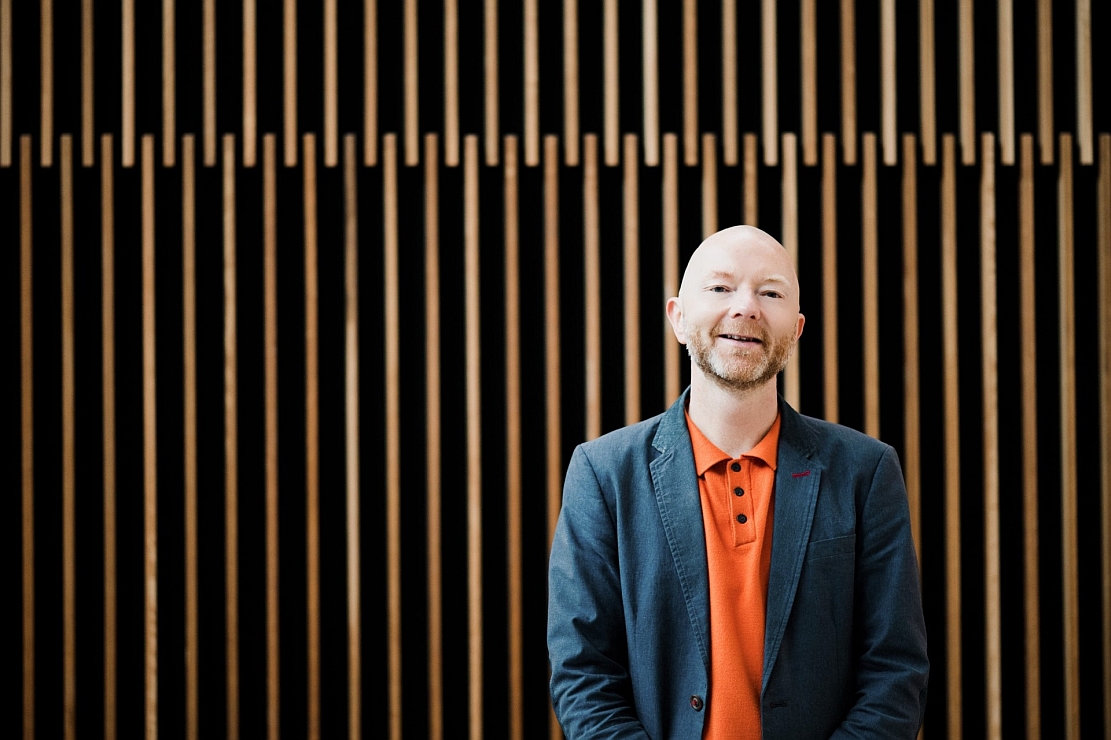
Dr Julian Skyrme, the director of Social Responsibility at the University of Manchester. Julian is outspoken, dedicated and tireless in his work.
What was your starting point?
Rather than a typical approach universities take, which is to ask ‘what are we good at?' we began with the question of ‘what are we good for? which I think is a more inspiring and engaging conversation starter. Our basic premise is that it’s our job to try to leave the world as a better place than we found it. How you approach the issue, is a matter of perspective: if you are an administrator processing an invoice in the finance department, social responsibility can mean several things. The administrator can think about ways to engage local suppliers more or employ local businesses. They can weigh the firm’s sustainability policies such as whether they deliver in an economic way, and find out if the people they are trading with, pay their employees a decent wage and so on. They can think about resources being used and supply chains.
If you are a teaching member of staff, you may think differently about social responsibility: for you it is about the students in your class. What are the social backgrounds of those you accept and reject to come and study with you? Can the university help students who are from less privileged backgrounds who show promise but have slightly lower grades but have done really well to get there? Are you thinking about their future potential? A student studying maths doesn’t just learn about that discipline but learns about ethics and big questions that we face like the future of AI and sustainability – and so these things need to be part of what we teach.
It is a broad approach that goes beyond the walls of the institution yet also influences it at every level…
Society relies on people with university education to think about these things and they play a role in future society. That of course includes research. Just in my own university, we developed the first computer that could store memory, in 1948. One of our famous academics, Alan Turing, predicted AI and back in the 1950s and defined what a thinking computer should look like – and how AI could ber tested - the Turing Test. Questions, such as the future of AI, are today only growing in importance. Having a social purpose is the common denominator in all of that we do – in essence it’s about using our knowledge for good.
What are some initiatives that are paramount at the University of Manchester?
If we are talking about students, I would point to our Manchester Access Programme. This is our flagship programme, which supports five hundred local pre-University students each year who all have one thing in common: none of their parents ever studied at university. We use all sorts of other factors to further gauge eligibility: whether applicants went to a low performance school, lived in a poorer area of the city - a range of things. They are not from a typical group expected to study at university and it will be more difficult for them when they try. However, they have demonstrated impressive potential: they may be at a slightly lower level than some of our student pool at the start but with a bit of help from the university, they can become future leaders, future barristers, engineers, medics and business people. We’ve been doing this now for just over 15 years and the results have been transformational for students and for our city region.
You can now find former beneficiaries of this programme everywhere in our area. If I suffer an injury and need to go to the local hospital, there is now a fair chance I will be treated by a doctor or nurse who came through our Manchester Access Programme. If I walk into a law firm in Manchester needing legal advice, a person helping me there may have had their life transformed through this initiative. I personally had the privilege of the developing that programme: I used to be the director of admissions and student requirement, and it is one of the proudest things I have done in my career. It is tangible because these kids know that if we had asked only for the standard grades – top A grades for medicine for example - they wouldn’t have gotten in. Not without this programme. Yet today, they are top doctors with good lifestyles and kids of their own and this is a life-changing opportunity. This is one of the programmes that I am really proud of because you can see it’s tangible impact.
It is inspirational even just hearing about it…
It is and it’s an example where there is both an individual benefit to those students, in terms of their own mobility, but also a societal benefit. This is because professions like medicine, law, journalism and politics are key parts of our democratic life, yet they are often the preserve of a narrow section of more privileged people. Our whole society gains when we open these important social functions up to more diverse people, with different life experiences and perspectives. We then get better treatment, fairer laws, empathetic politics and higher quality journalism. This is where social mobility is not just an individual gain – diversity improves society for everyone.
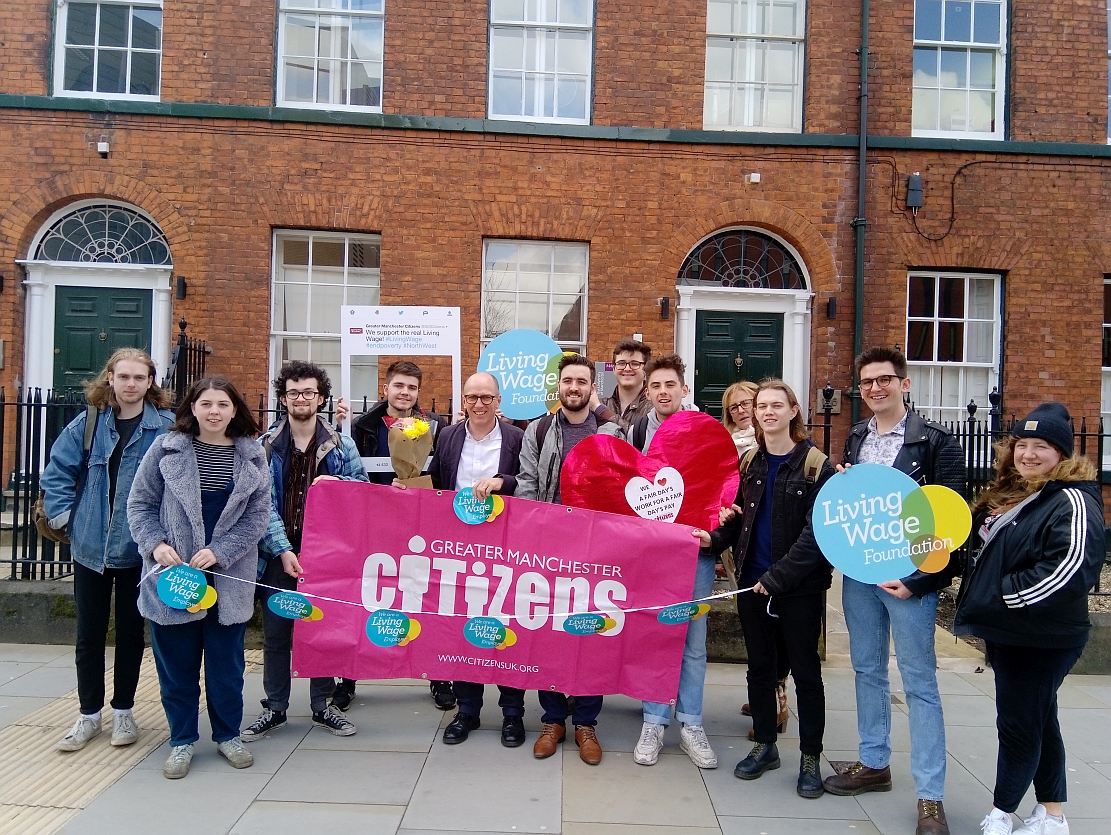
Numerous issues on the agenda are important and UoM has set an example by offering a living - as opposed to a minimum - wage.
Another area, which is of great importance, is research.
If I had to pinpoint some of the impact it has had over the last 10 years, it would be in some of the climate research my colleagues did in our Tyndall Centre. Here we took the Paris Agreement, which calculates the total carbon we can emit globally to remain within the 1.5 degrees Celsius climate change target and broke this down to in a model for mayors and leaders of cities to know, in scientifically-credible way, how much carbon they could emit. It was remarkable to break it down like this and pleasingly our elected mayor drew on this to set our zero carbon target for Greater Manchester, which has a population of neatly three million. So now every policy we see, whether it’s building new roads, planting new trees, building a new retirement community, adding new schools, or introducing different types of buses – all of them have to be compatible with the 2038 zero carbon target.
Where did that target date come from? It came from complex mathematical and climate science from the University of Manchester. This is a really good example where we were able to produce a science-based target not just for our university but for the whole city region. Whether you’re a football club like Manchester United, Manchester City, a big business or a construction firm operating in Manchester, this is something we’re all signed up to. So this is something that has affected real peoples’ lives already and is a really good example of how we can help drive better decisions and behaviours across our city and region.
Universities cooperate through various initiatives, alliances and exchanges: what advice would you have for a school like Charles University, which has made sustainability a priority but has a lot of work ahead?
It all comes back to strategy, every time. Unless you make it a part of your official strategy, then you are really just really relying on good will. I think you can tell that I really believe in this, but not everyone at university has to be like me. We have lots of busy people in our universities and for many they just want to get behind new institutional policies. But you do have to establish the culture of the organisation and determine what kind of a place you want it to be. Yes, it’s about values and we probably employ people who think a bit like me, but universities would be terribly dull places if everyone believed the same thing. I believe that the most effective way to drive cultural change is through careful establishment of new norms – it’s often the dull stuff of changing policies and processes, measuring things we never used to, making people feel valued for their contributions at all levels.
Take our Manchester Access Programme – a lot of people really believe in the ethos of the affirmative action underpinning this programme. But some others don’t and this doesn’t have to matter as long because everyone has agreed to follow the new norms set by which we admit such students with different grades to others. That’s the policy. And that never would have happened unless we first had an overall institutional strategy that gave primacy to such work. Money was put into it, policies were changed and now and now we just follow this rather than have to keep having philosophical debates about the nature of social justice, as important as these are! So my advice to anyone, or any school following a similar path, would be this: agree on your strategy first, put the right people into place in key positions to deliver it, and relentlessly pursue this through your policy and performance processes. Try to get things in from the very top, measure them, hold yourself to account on them. No measures are perfect but you have to choose some. Don’t try and solve everything, and start with your strengths. What is Charles University already very good at? Double your efforts in that area. I would pinpoint what the university does really well and ‘put rockets under that’.
Another thing I would advise anyone is to open yourself up to perspectives from outside the university to get a plurality of views. We’ve done surveys and created ongoing panels and assemblies with local citizens and with external stakeholders. They tell us things that are sometimes difficult to hear and make us realise we’re not as good as we sometimes tell ourselves! When you hear perspectives from outside the university you realise your job is never done. There is always much more to do if we want universities to be more relevant to people’s everyday lives.
| Julian Skyrme, PhD |
| Julian Skyrme is the founding Director of Social Responsibility at The University of Manchester. The university is unique in the United Kingdom’s higher education for having social responsibility as a core goal. Julian has three degrees from The University of Manchester: a BA in Political Philosophy, Economics and Social Sciences (first-class honours); an MA degree in Social Research (distinction); and a Doctor of Education (EdD) in educational policy and philosophy. Following his early career in school education he became The University of Manchester's first Head of Widening Participation in 2004 and its first full-time Director of Social Responsibility in 2012. Julian is the first person in his family to benefit from university and is passionate about its social purpose and accessibility. Our interview with Julian is featured in an upcoming special print edition of Forum CZ dedicated to sustainability at Charles University. The issue will be available in mid-March. |


